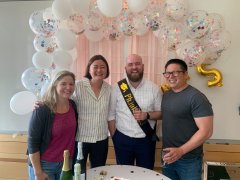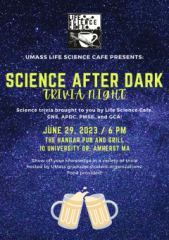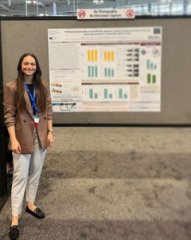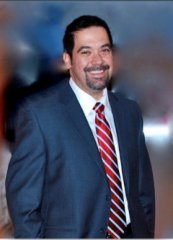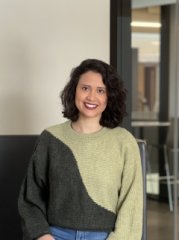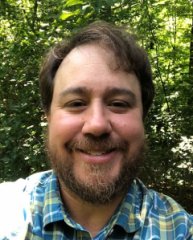News & Announcements
Sarah Tucker MS Defense
Sarah Tucker MS Defense
"Climate Change, Giant Viruses and Their Putative Hosts"
July 13, 2023
Danny McSweeney successfully defended his PhD work
Danny McSweeney successfully defended his PhD work
"Investigating Signaling Mechanisms of Neuronal Maturation and Synapse Function in Human Induced Neuronal Cells"
Advisor: ChangHui Pak
Calling all CNS Grad Students!
Calling all CNS Grad Students!
Happy end of the semester and start of summer! To celebrate, join your fellow grad students for an evening of food, fun, and trivia presented by CNS and Life Science Café and sponsored by your Graduate Student Organizations! Show off your science, UMass, and Sci-Fi knowledge on the 29th of June at 6pm at the Hangar Bar and Grill (10 University Dr., Amherst, MA)
We’ll buy the food and you buy the drinks! We hope to see you there!
Pre-register your trivia team and win an extra trivia point! Make a team ahead of time or join one day-of! Maximum of 8 people per group please. If there are more, feel free to break into two groups!
There will be questions across 5 different topics so get ready to be challenged!
Any questions? Please email: sglasser@umass.edu
MS Thesis defense - Sungwoo Hwang
MS Thesis defense - Sungwoo Hwang
"Investigating diterpene biosynthesis in Medicago truncatula"
Advisor: Sibongile Mafu
Sungwoo joined the lab in Fall 2022. In the 9 monthe she has been with us she has performed preliminary biochemical investigations on diterpene biosynthesis- small molecules that modulate growth and defense - in a legume, Medicago truncatula.
May 23, 2023
Efecan Aral PhD Dissertation defense
Efecan Aral PhD Dissertation defense
Establishing Personalized Medicine in Fabry Disease through Functional Analysis of Disease Mutants
Advisor: Scott Garman
Friday May 19, 10am
Madeline Tompach wins Mechanisms Specialty Section Sheldon D. Murphy Graduate Student Endowment Award
Madeline Tompach wins Mechanisms Specialty Section Sheldon D. Murphy Graduate Student Endowment Award
Congratulations Madeline (MCB 4th year PhD candidate in Alicia Timme-Laragy’s lab) on winning Sheldon D. Murphy Graduate Student Endowment Award and graduate student travel award from the Northeast Society of Toxicology Chapter.
IDGP Diversity, Equity and Inclusion Statement
IDGP Diversity, Equity and Inclusion Statement
The Interdepartmental Graduate Programs in Life Sciences (IDGPs) believe that a diverse, equitable and inclusive environment is critical to all that we do. We recognize that systemic racism exists in our society and we pledge to educate ourselves so that we can change our ingrained habits and beliefs. We are committed to make our programs accessible to all and to increase the success of all our members. We dedicate our time, effort and financial resources to these activities. We work with Institutional leaders, faculty, staff and students to achieve these goals. We are providing this pdf link so that you are able to view a working document of our activities.
We are proud of our amazing students and post docs who have worked tirelessly for the betterment of our community. Our students have fostered a tight-knit, progressive community and their recent efforts have resulted in this petition for systematic change. We stand with them in recognizing that change is required in order to make progress toward a more equitable, just, diverse and inclusive environment.
The University has established an Office of Diversity, Equity and Inclusion and their website provides links to many resources. We encourage you to make use of these tools, including links to videos, books and podcasts as well as programing, as we embark together on our journey to improve our community for all our members.
Juan Guillermo (Guillo) Cadena Memorial Fund
Juan Guillermo (Guillo) Cadena Memorial Fund
Dr. Juan Guillermo (Guillo) Cadena
Guillo was born in Chicago, IL. on November 22, 1969, and grew up in Tampa, Florida. Guillo was a graduate of Jesuit High School in Tampa where he excelled in athletics and was a member of the state champion soccer team. He moved to New England in the mid-1990s and received his undergraduate degree from the University of Massachusetts Amherst in 2000. After a brief return to Florida, Guillo moved back to Amherst in 2002 to join the Molecular and Cellular Biology (MCB) graduate program as a Ph.D. candidate. Guillo received his Ph.D. in 2009 under the mentorship of Dr. Larry Schwartz. Dr. Cadena’s research focused on understanding why a certain population of cells called dopaminergic neurons are uniquely vulnerable to degeneration in individuals with autosomal juvenile parkinsonism (ARJP).
Guillo was extremely dedicated to his research and had always credited the successful completion of his Ph.D. to the strong support of his advisor Dr. Schwartz, as well as many distinguished faculty members in the MCB program who guided him throughout the process. Guillo also conducted research at the Pioneer Valley Life Sciences Institute in Springfield, MA.
In his teenage years, Guillo was diagnosed with aplastic anemia and sought a suitable bone marrow donor for nearly 30 years. In 2010, Guillo was diagnosed with metastatic cancer and within a few months had succumbed to complications from chemotherapy treatment. At the time of his passing in July, 2010 Guillo was survived by his wife, 2-year old twins (Amaya and Gabriel), parents, siblings, and many close friends.
The Cadena Travel and Training Fund
The Cadena Travel and Training Fund was established in 2020, 10 years after Guillo’s passing. In memory of his dedication to science and teaching, Guillo’s close friends Nasser and Susanne Rusan, with help and support from Guillo’s family, believed it was only fitting to keep Guillo’s memory alive by giving back to the MCB program, a program that Guillo deeply cherished. Read more
Fermino do Rosario wins Cadena Travel Award
Fermino do Rosario wins Cadena Travel Award
Congratulations to Carline Fermino do Rosario for being awarded the Cadena Travel and Training Award for 2022! The Cadena Award supported Carline’s enrollment in an intensive Quantitative Fluorescence Microscopy course held at the MDI Biological Laboratory in Bar Harbor, Maine in the summer of 2022. While attending this intensive one-week course, Carline expanded her knowledge and expertise in microscopy methods to further dissect important questions in living cells. In addition to hands-on experience with advanced microscope systems, Carline learned quantitative analytical methods to digest the data she collected. This invaluable opportunity not only helped Carline advance her research but also propelled her professional development, as she added new skills to her toolbox and deepened her understanding of microscopy techniques.
Carline grew up in Cabo Verde, an archipelago off the west coast of Africa. She moved to the United States at the age of 17 and graduated from New Bedford High School in Massachusetts. For college, she attended Bristol Community College before transferring to the University of Massachusetts Amherst, where she received her Bachelor of Science in Biology in 2017. She continued on to pursue her Ph.D. in Molecular and Cellular Biology at UMass. She is a first-generation graduate student.
Carline is a Ph.D. candidate studying the mitotic spindle under the guidance of Professor Patricia Wadsworth. For successful division, the spindle microtubules must align the chromosomes, elongate to segregate the chromosomes, and signal for cytokinesis. She is interested in the kinetics and mechanism of microtubule stabilization as the cell divides. Her project aims to understand the dynamics of microtubules in the midzone throughout anaphase using photoactivation of LLCPk1 cells expressing PA-GFP tubulin. At UMass, she uses powerful resources at the Light Microscopy Core Facility such as the Resonant Scanning Confocal instrument. The Wadsworth laboratory uses live cell imaging as a tool to enhance the understanding of the processes that govern cell division.
The Cadena Travel and Training Fund honors the legacy of MCB alumnus Dr. Juan Guillermo (Guillo) Cadena. In 2010, Guillo was diagnosed with metastatic cancer and within months succumbed to complications from treatment. At the time of his passing in July 2010, Guillo was survived by his wife, 2-year-old twins (Amaya and Gabriel), parents, siblings, and many close friends. The Cadena Award was established in 2020, 10 years after Guillo’s passing, in memory of his dedication to science and teaching. Guillo’s close friends Nasser and Susanne Rusan, with help and support from Guillo’s family, sought to keep his memory alive by giving back to the MCB program by establishing the Cadena Travel and Training Fund.
MCB director Thomas Maresca wins Fulbright
MCB director Thomas Maresca wins Fulbright
There are more cells in the human body than there are stars in the Milk Way, and billions of these cells reproduce themselves every day through cell division. Essentially, a single cell splits, pulling apart its chromosomes perfectly, and then reforming as two separate cells with two separate, but full sets of perfectly identical chromosomes. Normally, this process works flawlessly, but when it doesn’t, when more chromosomes wind up in one cell than the other—a condition called aneuploidy—the results can be serious and range from cancer to birth defects.
Thomas Maresca, professor of biology at UMass Amherst, is an expert in cell division, and his work was recently recognized by the Fulbright Scholar’s program. Maresca will spend the Spring semester at Portugal’s Institute de Investigação e Inovação em Saúde da Universidade do Porto working closely with another leader in the field of cell division, Helder Maiato. Maiato has recently pioneered the use of Indian Muntjac (barking deer) cells to study cell division, which is a powerful advance because it allows cell division researchers to apply a reductionist approach to an incredibly complex process in living cells.
Maresca’s goal is to map the pathways that cells utilize to achieve faithful chromosome segregation, which is vital to normal embryonic development and the maintenance of healthy tissues through adulthood. To do so, he and his colleagues need to find answers to two crucial questions: how do cells detect and correct errors during division, and how do cells actually reinforce the physical connections between the chromosomes and the spindle, which is the structure that helps pull the chromosomes apart.
“Scientifically speaking, I can’t wait to get to work with Helder Maiato and his team to make important contributions to our field and to also establish an impactful international collaboration,” says Maresca. “Beyond the science, the Fulbright Program was formed after World War II to promote peace by building cultural bridges between the U.S. and nations around the world, which means that the program expects its awardees to serve as ‘cultural ambassadors.’ It is exciting and humbling that my family and I have been given the opportunity to serve in this role and to help advance the Fulbright’s mission.”
